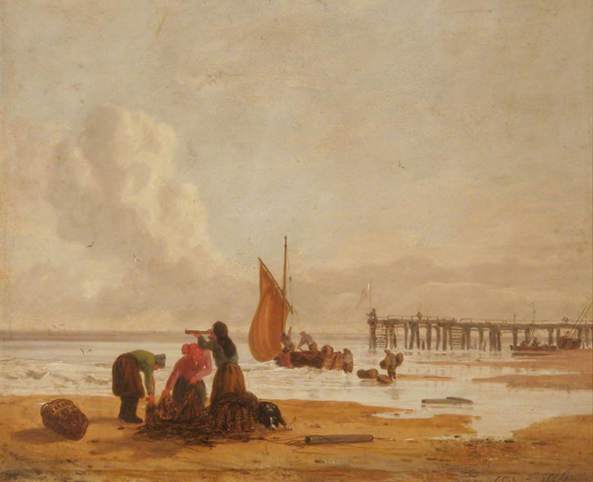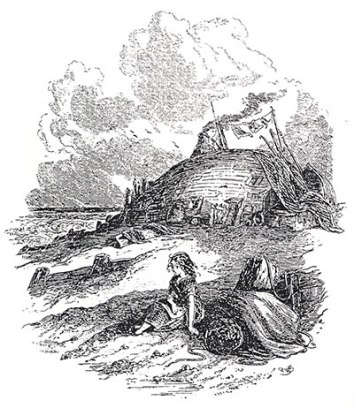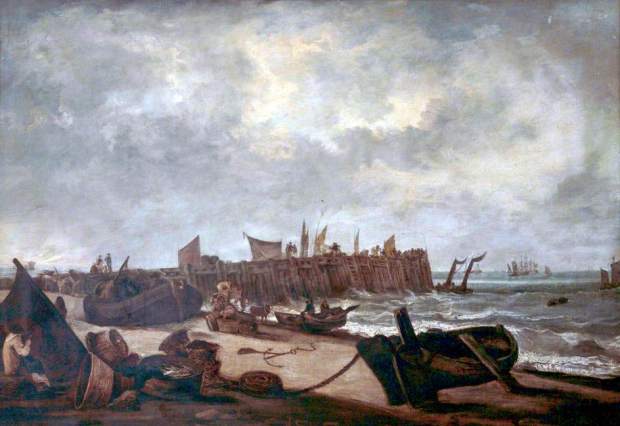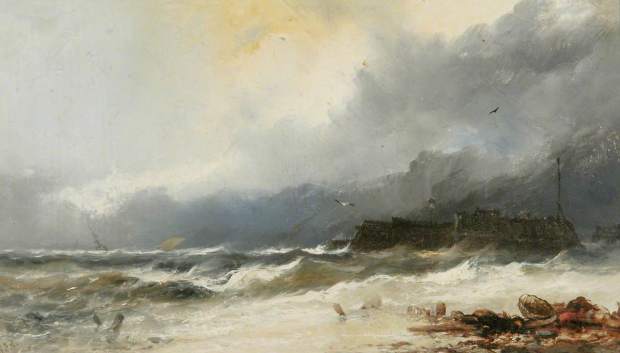Charles Dickens, The Personal History of David Copperfield (originally published as a monthly serial 1849–1850). Text from Wikisource: https://en.wikisource.org/wiki/Personal_History_of_David_Copperfield_(1850)
One of the most important locations that David Copperfield travels to as a child and as an adult is Yarmouth, the home of the faithful Peggotty family. In a particularly dramatic passage, Dickens describes an enormous storm that sweeps over the coastal town and wreaks destruction on the lives of the inhabitants there. The scale of the storm is so great it becomes sublime, as its power is both terrible and awe-inspiring.
“We made so many deviations up and down lanes, and were such a long time delivering a bedstead at a public-house, and calling at other places, that I was quite tired, and very glad, when we saw Yarmouth. It looked rather spongy and soppy, I thought, as I carried my eye over the great dull waste that lay across the river; and I could not help wondering, if the world were really as round as my geography book said, how any part of it came to be so flat. But I reflected that Yarmouth might be situated at one of the poles; which would account for it.
As we drew a little nearer, and saw the whole adjacent prospect lying a straight low line under the sky, I hinted to Peggotty that a mound or so might have improved it; and also that if the land had been a little more separated from the sea, and the town and the tide had not been quite so much mixed up, like toast and water, it would have been nicer. But Peggotty said, with greater emphasis than usual, that we must take things as we found them, and that, for her part, she was proud to call herself a Yarmouth Bloater.
When we got into the street (which was strange enough to me) and smelt the fish, and pitch, and oakum, and tar, and saw the sailors walking about, and the carts jingling up and down over the stones, I felt that I had done so busy a place an injustice; and said as much to Peggotty, who heard my expressions of delight with great complacency, and told me it was well known (I suppose to those who had the good fortune to be born Bloaters) that Yarmouth was, upon the whole, the finest place in the universe. (Chapter 3, I Have a Change)

Alfred Standard, Yarmouth Beach, Norfolk, 1847; Great Yarmouth Museums; http://www.artuk.org/artworks/yarmouth-beach-norfolk-1980
“So the fortnight slipped away, varied by nothing but the variation of the tide, which altered Mr. Peggotty’s times of going out and coming in, and altered Ham’s engagements also. When the latter was unemployed, he sometimes walked with us to show us the boats and ships, and once or twice he took us for a row. I don’t know why one slight set of impressions should be more particularly associated with a place than another, though I believe this obtains with most people, in reference especially to the associations of their childhood. I never hear the name, or read the name, of Yarmouth, but I am reminded of a certain Sunday morning on the beach, the bells ringing for church, little Em’ly leaning on my shoulder, Ham lazily dropping stones into the water, and the sun, away at sea, just breaking through the heavy mist, and showing us the ships, like their own shadows.” (Chapter 3, I Have a Change)

Halbot Browne (Phiz), Little Emily, 1849-50. Image from David Perdue’s Charles Dickens Page.

John Crome (1768-1821), Old Jetty, Yarmouth; Williamson Art Gallery & Museum; http://www.artuk.org/artworks/old-jetty-yarmouth-67261
“It was a murky confusion – here and there blotted with a colour like the colour of the smoke from damp fuel – of flying clouds, tossed up into most remarkable heaps, suggesting greater heights in the clouds than there were depths below them to the bottom of the deepest hollows in the earth, through which the wild moon seemed to plunge headlong, as if, in a dread disturbance of the laws of nature, she had lost her way and were frightened. There had been a wind all day; and it was rising then, with an extraordinary great sound. In another hour it had much increased, and the sky was more overcast, and blew hard.
But, as the night advanced, the clouds closing in and densely over-spreading the whole sky, then very dark, it came on to blow, harder and harder. It still increased, until our horses could scarcely face the wind. Many times, in the dark part of the night (it was then late in September, when the nights were not short), the leaders turned about, or came to a dead stop; and we were often in serious apprehension that the coach would be blown over. Sweeping gusts of rain came up before this storm, like showers of steel; and, at those times, when there was any shelter of trees or lee walls to be got, we were fain to stop, in a sheer impossibility of continuing the struggle.
When the day broke, it blew harder and harder. I had been in Yarmouth when the seamen said it blew great guns, but I had never known the like of this, or anything approaching to it. We came to Ipswich – very late, having had to fight every inch of ground since we were ten miles out of London; and found a cluster of people in the market-place, who had risen from their beds in the night, fearful of falling chimneys. Some of these, congregating about the inn-yard while we changed horses, told us of great sheets of lead having been ripped off a high church-tower, and flung into a by-street, which they then blocked up. Others had to tell of country people, coming in from neighbouring villages, who had seen great trees lying torn out of the earth, and whole ricks scattered about the roads and fields. Still, there was no abatement in the storm, but it blew harder.
…
The tremendous sea itself, when I could find sufficient pause to look at it, in the agitation of the blinding wind, the flying stones and sand, and the awful noise, confounded me. As the high watery walls came rolling in, and, at their highest, tumbled into surf, they looked as if the least would engulf the town. As the receding wave swept back with a hoarse roar, it seemed to scoop out deep caves in the beach, as if its purpose were to undermine the earth. When some white-headed billows thundered on, and dashed themselves to pieces before they reached the land, every fragment of the late whole seemed possessed by the full might of its wrath, rushing to be gathered to the composition of another monster. Undulating hills were changed to valleys, undulating valleys (with a solitary storm-bird sometimes skimming through them) were lifted up to hills; masses of water shivered and shook the beach with a booming sound; every shape tumultuously rolled on, as soon as made, to change its shape and place, and beat another shape and place away; the ideal shore on the horizon, with its towers and buildings, rose and fell; the clouds fell fast and thick; I seemed to see a rending and upheaving of all nature. (Chapter 55, Tempest)

unknown artist; Jetty at Great Yarmouth, Norfolk, nineteenth century; Great Yarmouth Museums; http://www.artuk.org/artworks/jetty-at-great-yarmouth-norfolk-2069